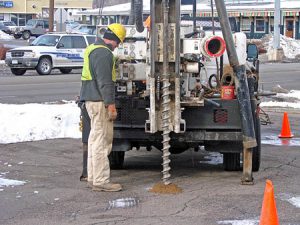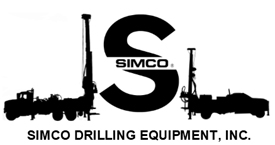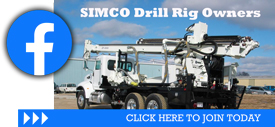
Performing proper maintenance on your drill rig throughout the year is essential, including the hydraulic system. While the hydraulic system does not typically come in direct contact with the drilling surface or experience the kind of dirt and moisture exposure as the rest of the drill, there are specific ways to care for your drill rig hydraulics properly. Building on last month’s post concerning off-season drill maintenance, you’ll want to execute these specific hydraulics tips to ensure the longevity of the entire rig.
Your Hydraulic System Begins with the Oil
Failure to maintain sufficient, clean oil can result in catastrophic problems within the engine. The same is true with a drill rig hydraulics system. “Think of the hydraulic oil as the blood and the hydraulic pump as the heart of the system,” said Darren Swolley, SIMCO’s North American Sales Expert. “Just like in the human body, the heart will stop if you clog it or get a sludge build up in it.” Oil flowing through the hydraulic system keeps it running smoothly, working in tandem with the oil filter. “Many of the oils on the market do meet minimum standards, but the minimum just isn’t enough,” said Swolley. “Cheap oil will cause you problems, and your drill rig is a huge investment that is your livelihood.” Using the proper grade of oil for your climate is also very important so that your oil performs at all the temperature ranges in your local environment.
Quality and Kind Matters
The rig’s hydraulics are exceptionally important in keeping the rig going. Most people do not understand the importance of quality parts, and think all are the same. You may consider cheap oil for the drilling rigs, but you’ll often find you get what you pay for. Inferior oil leads to more contamination, which means you’ll need to change out the oil more frequently. Inexpensive filters do not catch as much and this increases the potential of damaging the entire hydraulic system. Using improper oil and filters can also void your warranty, which will leave you in a tight spot if your drilling rig encounters any problems. The SIMCO service department always has the proper filter in stock for all SIMCO drill rigs.
“Hydraulic engineers design these systems with specific levels of filtration in mind: if too much is filtered, the flow is restricted and you will starve your rig’s hydraulic pumps,” said Darren Swolley. “If not enough is filtered and the system gets dirty, pumps and motors will start to fail and your project grinds to a halt. When your pump fails, you’re no longer making money – you’re spending it on repairs and regretting the decision to cut corners on your oil and filters.”
Filter The System
SIMCO Drilling Equipment does many things behind the scenes that customers don’t realize when they purchase their rig. “We make all of our own hydraulic hoses, making sure they are the correct size and then we clean out every hose by flushing it with a cleaning agent,” said Swolley. Multiple filters are put into the SIMCO drill rig system to filter the incoming and outgoing hydraulic oil, and these filters are very specific to SIMCO drill rigs. Cleaning the system not only changes out the fluids but also helps push out contaminants that build up over time. Performing a hydraulic system cleaning during the off season will pay major dividends in your drilling rig’s performance. “It’s also important to remember that when you replace a failing pump or motor, you must properly clean the drill rig hydraulics system,” Swolley continues. “When you continue to circulate contamination from failing pumps and motors, you’re setting up the new parts to fail before they’ve even started.”



